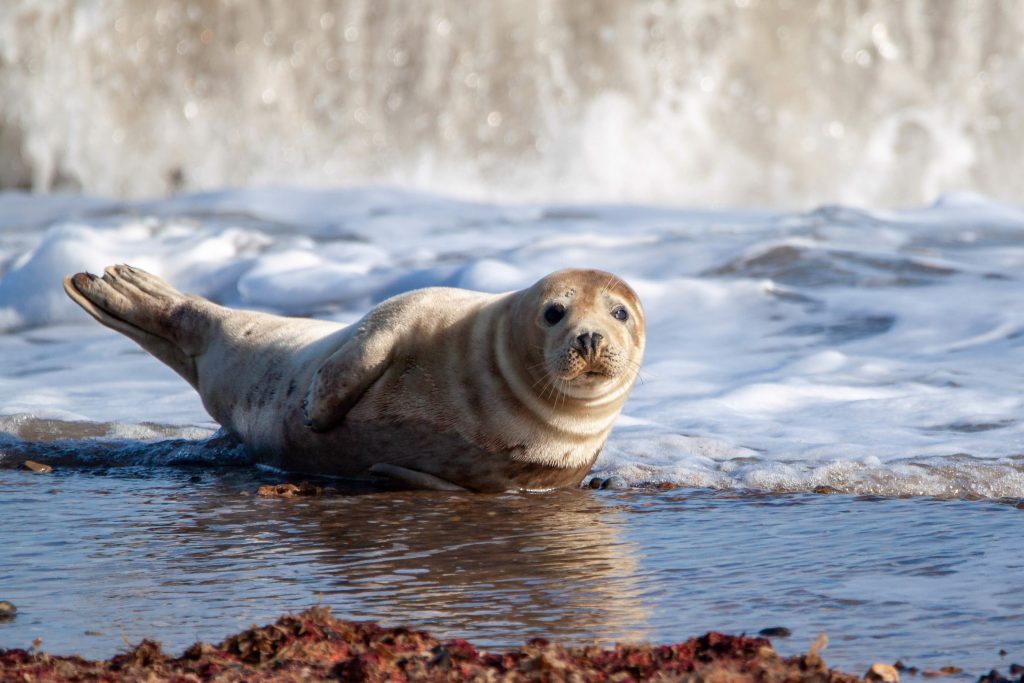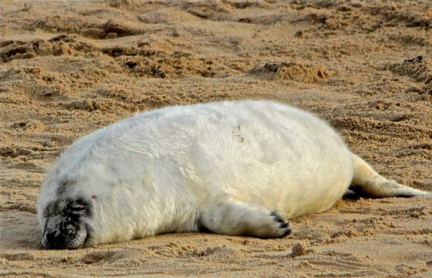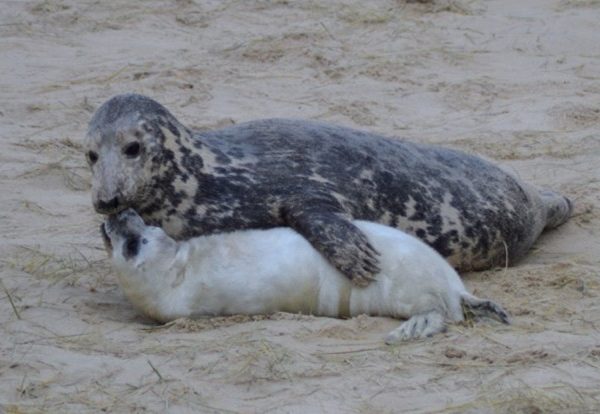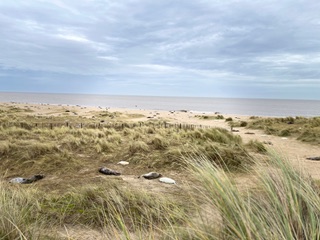Visit the website here or scan the QR Code Below.

Would you like to support Friends of Horsey Seals and their work protecting the seals on the East Norfolk coastline? For a subscription of £12 per year which covers your whole household, you can become a Friend of our registered charity. This entitles you to exclusive content, quarterly newsletters and free guided walks during the pupping season. Friend’s contributions help us to pay for running our volunteer warden scheme and our seal rescue team. Go to our Friends section to find out more.
Helping Seals Thrive
The Atlantic Grey seal colony at Horsey and Winterton is one of Britain’s great wildlife spectacles. The flat beaches, shallow waters and high dunes offer seals an ideal location for giving birth. The work of Friends of Horsey Seals (FoHS) to protect the seals from disturbance and injury is vital for the long-term survival of the colony.

Photo by Laura Lake
Emergency?
If you see any seals in difficulty, please contact the FoHS Rescue Team on 07706 314514
or the RSPCA on 0300 1234999.


How we warden, rescue and campaign for the seals
Humans getting too close to seals, especially during the pupping season, can cause great distress and harm and lead to pups starving if they become separated from their mothers. Volunteer Wardens from Friends of Horsey Seals protect the seals during the breeding season and offer visitors designated viewing areas a safe distance from the colony.
In addition, an increasing number of seals are turning up with life-threatening injuries after becoming trapped in flying rings, ropes and netting and other discarded materials. Friends of Horsey Seals provide a trained rescue team to help sick and injured seals throughout the year. The charity actively supports a campaign to ban the sale of flying rings in coastal areas and is part of a national group seeking to improve legal protection for seals.


“A friendly team who went above and beyond to ensure our trip to see the seals was perfect.”
The Marshall Family

Photo by Mark Reynolds
Friends of Horsey Seals is a Registered Charity (Number 1169539). We are dedicated to protecting the grey seal colony at Horsey and Winterton from disturbance or harm. The charity relies totally on the continuing support of our donors and sponsors. We would simply not be able to carry on the work we do without this vital and generous support.
Donating to the Friends of Horsey Seals
One-off or monthly donation
If you would like to make a one off donation, you can do so either by debit or credit card or through PayPal.
Or you can donate to us monthly through a Direct Debit.
Become a Friend
Our Friends membership scheme gives you exclusive access to news, information and event previews.
Sign up for a year’s membership for
your whole household here.

© Friends of Horsey Seals 2024 • Registered Charity 1169539
Privacy Overview
| Cookie | Duration | Description |
|---|---|---|
| cookielawinfo-checkbox-analytics | 11 months | This cookie is set by GDPR Cookie Consent plugin. The cookie is used to store the user consent for the cookies in the category "Analytics". |
| cookielawinfo-checkbox-functional | 11 months | The cookie is set by GDPR cookie consent to record the user consent for the cookies in the category "Functional". |
| cookielawinfo-checkbox-necessary | 11 months | This cookie is set by GDPR Cookie Consent plugin. The cookies is used to store the user consent for the cookies in the category "Necessary". |
| cookielawinfo-checkbox-others | 11 months | This cookie is set by GDPR Cookie Consent plugin. The cookie is used to store the user consent for the cookies in the category "Other. |
| cookielawinfo-checkbox-performance | 11 months | This cookie is set by GDPR Cookie Consent plugin. The cookie is used to store the user consent for the cookies in the category "Performance". |
| viewed_cookie_policy | 11 months | The cookie is set by the GDPR Cookie Consent plugin and is used to store whether or not user has consented to the use of cookies. It does not store any personal data. |


